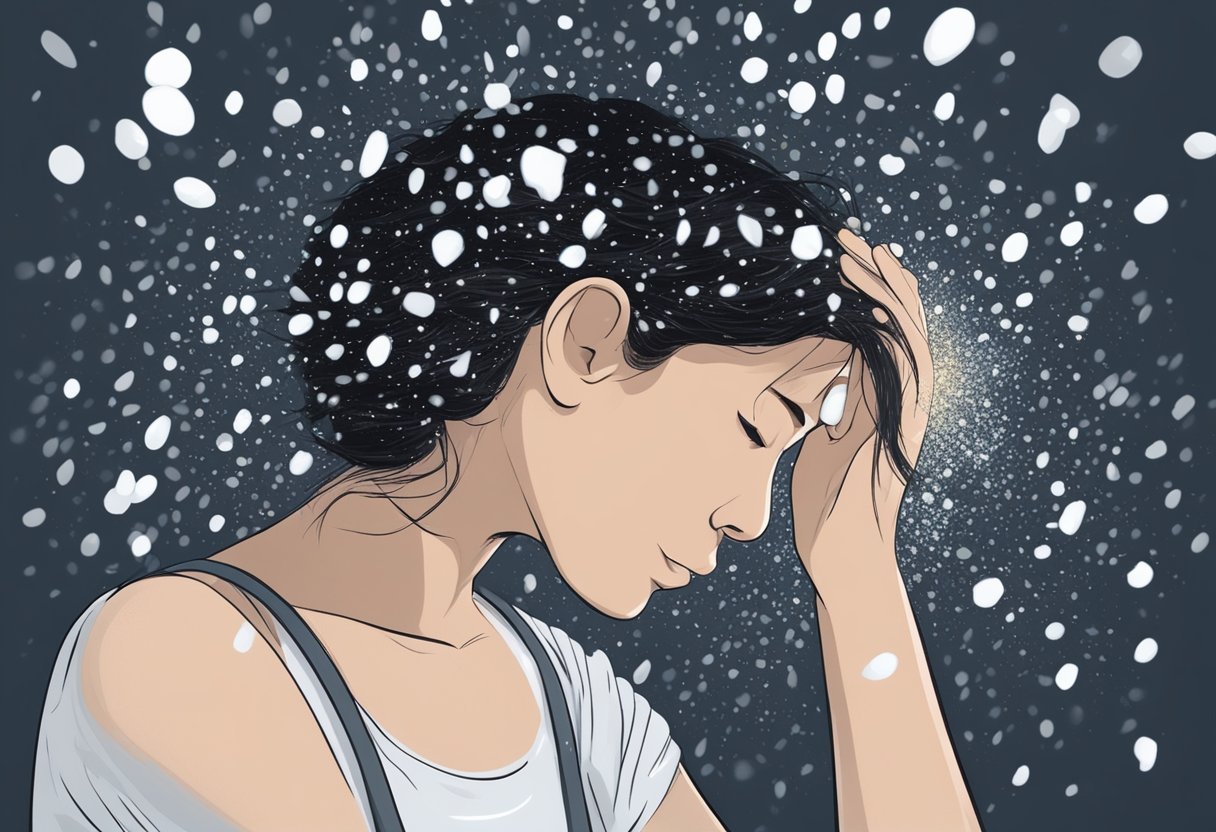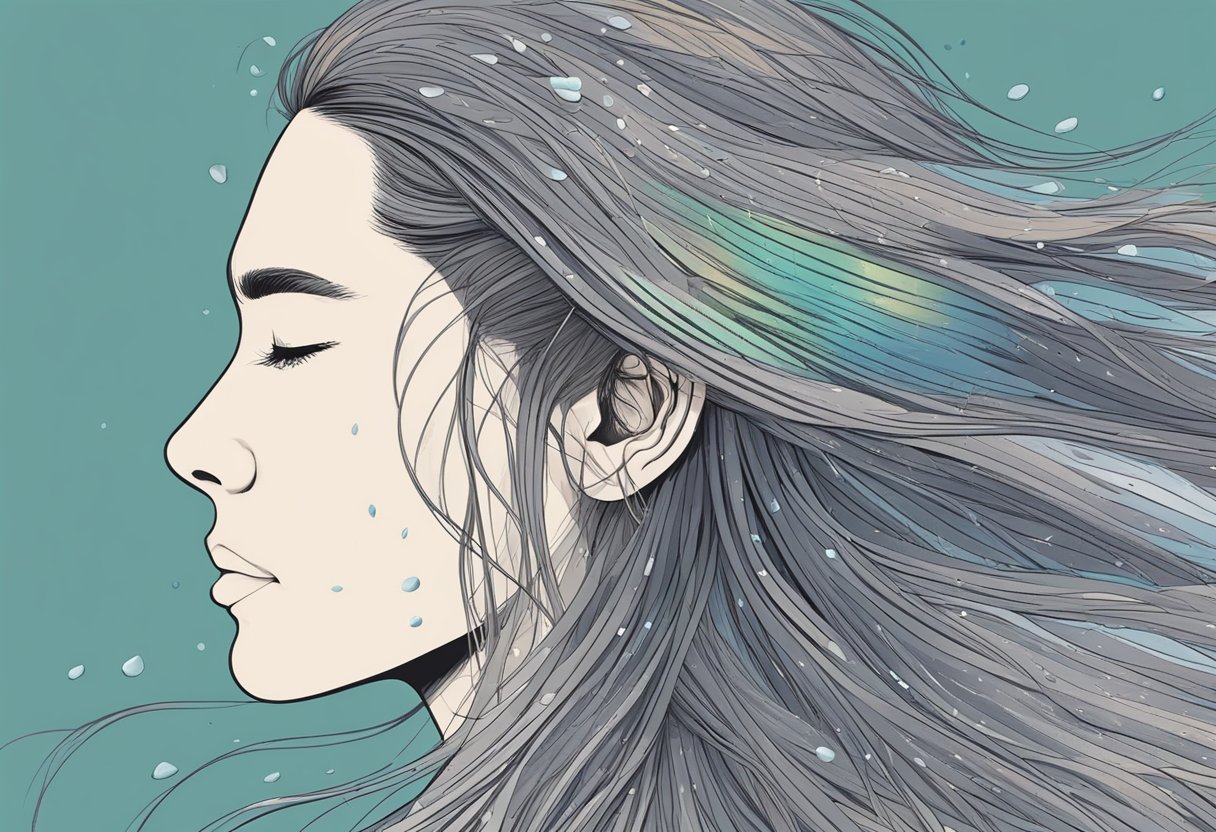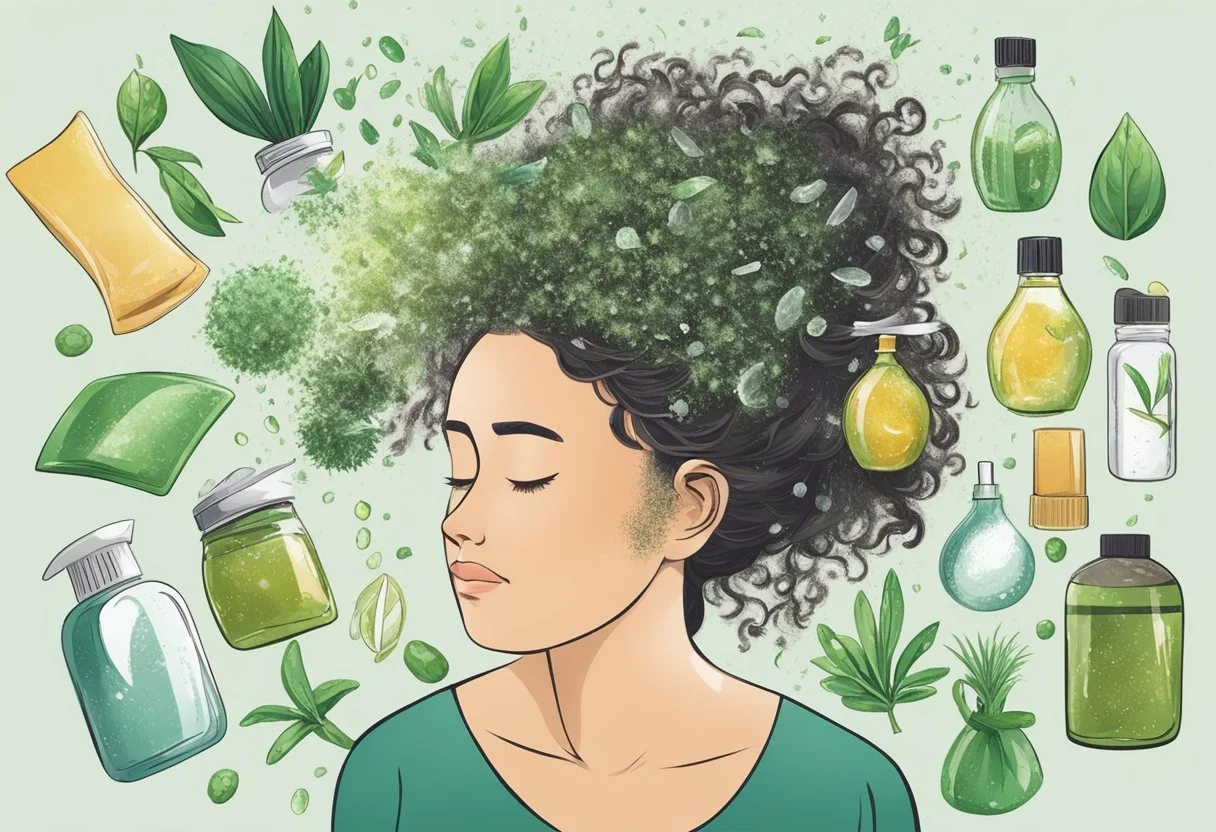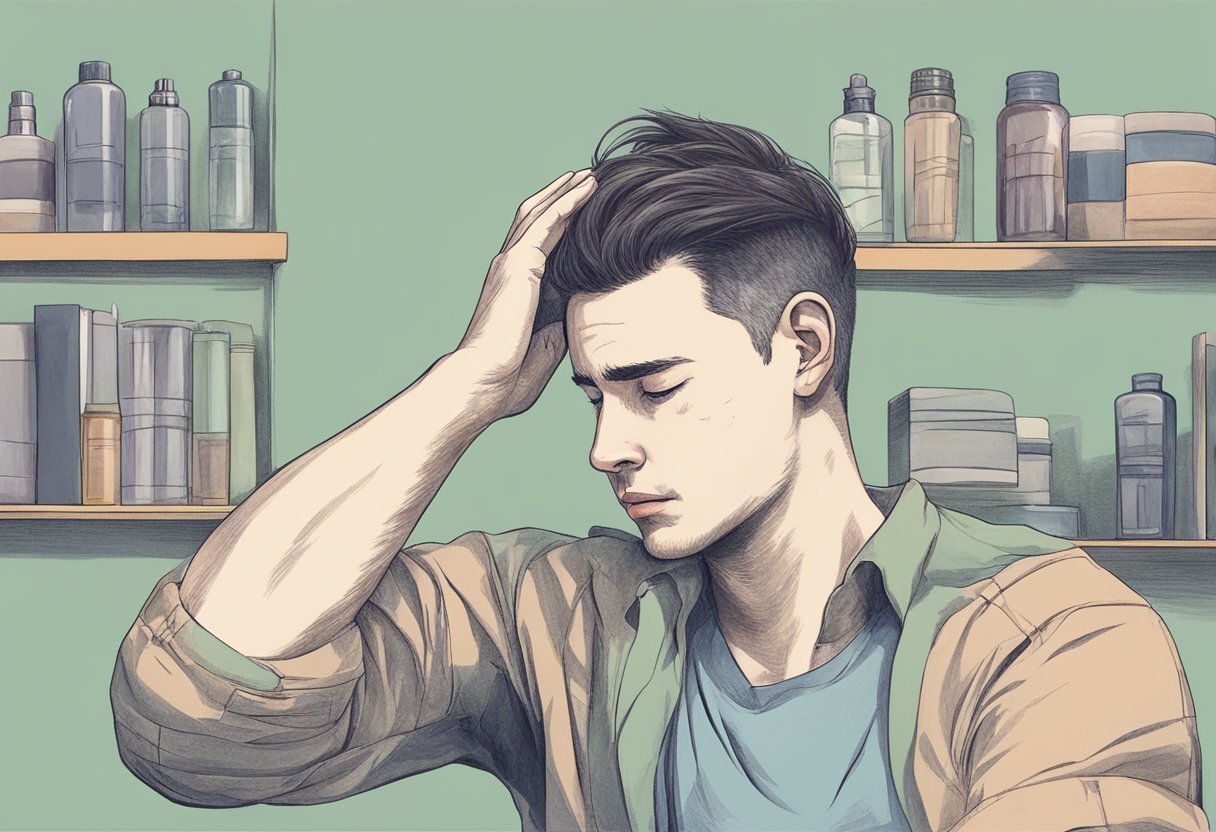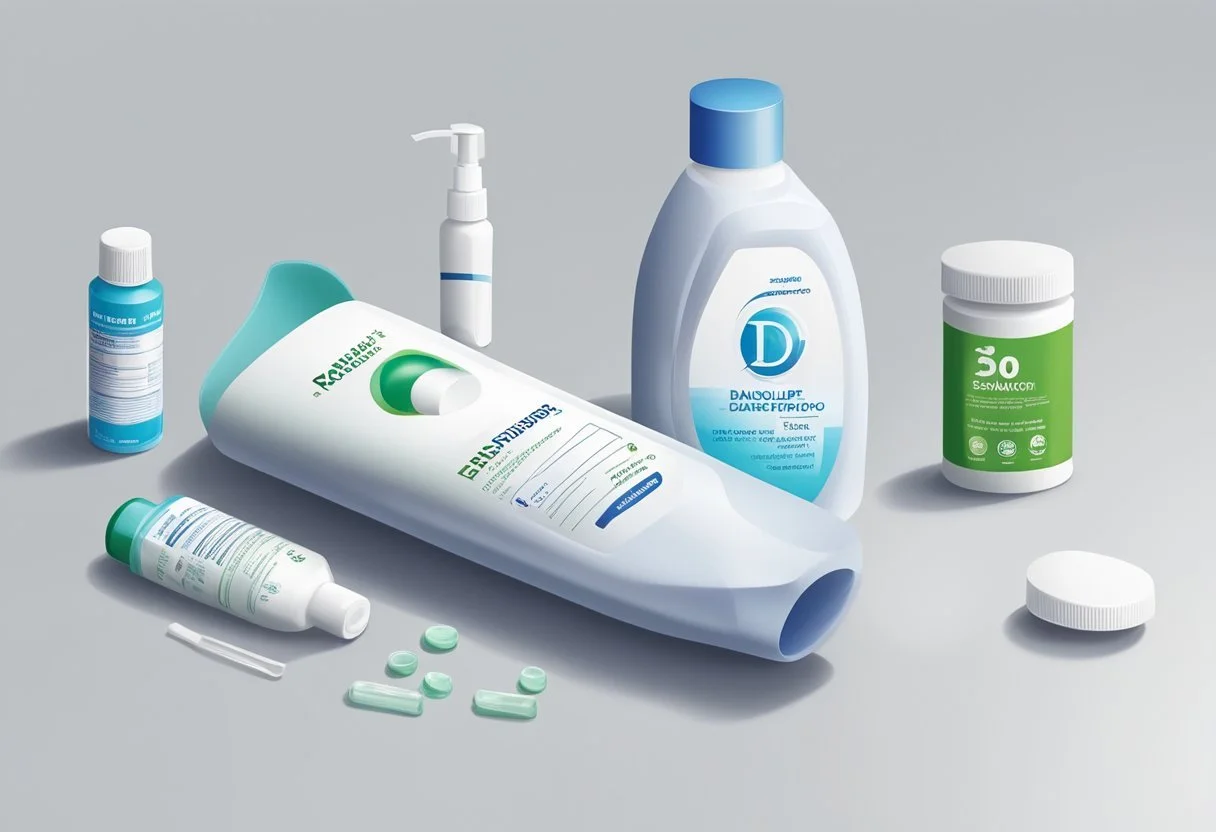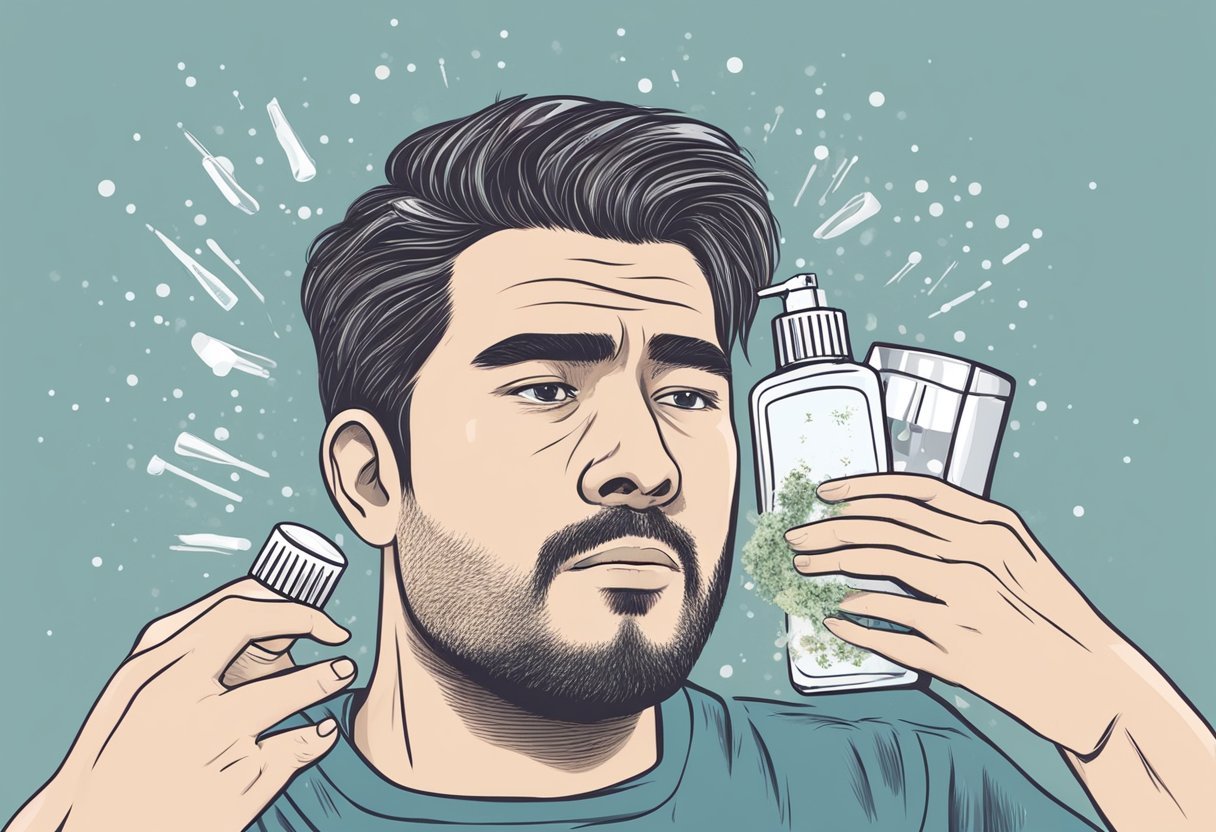Dandruff
Symptoms, Causes, and Home Remedies
Discover > Health Conditions > Dandruff: Symptoms, Causes, Home Remedies
Dandruff is a common scalp condition that affects a significant number of people around the globe. It presents itself as flakes of dead skin that can be accompanied by itchiness and redness. Although it is not a severe medical condition, dandruff can potentially cause discomfort and have a negative impact on an individual's confidence and overall well-being.
Understanding the symptoms, causes, and home remedies for dandruff can equip individuals with the necessary information to effectively manage and possibly prevent this condition. Knowing these details enables one to take prompt action and adopt appropriate measures to alleviate the symptoms and maintain a healthy scalp.
In this article, various aspects of dandruff will be explored, including its symptoms, such as itching and scaling, and the primary causes that trigger this condition. Additionally, a range of home remedies that can help alleviate dandruff will be discussed, providing individuals with affordable and accessible solutions to combat this common concern.
Understanding Dandruff
Dandruff is a common scalp condition characterized by the presence of white, oily flakes on the hair and the scalp. These flakes are the result of the natural shedding process of skin cells from the scalp. A mild amount of flaking is normal; however, excessive flaking can be a sign of a more serious skin condition.
One of the leading causes of dandruff is seborrheic dermatitis. This inflammatory condition affects the sebaceous glands in the skin, causing them to produce excessive oils. The overproduction of oil leads to a build-up on the scalp, which then causes flaking and itching.
There are several factors that can contribute to the development of dandruff:
Genetics: A predisposition to dandruff can be passed down through families.
Hormonal changes: Fluctuations in hormone levels may increase the risk of dandruff, particularly during adolescence.
Stress: Both physical and emotional stress can play a role in the development of dandruff.
Environmental factors: Dry or humid conditions, as well as seasonal climate changes, can affect the scalp and increase the likelihood of dandruff.
Personal hygiene: Infrequent hair washing can contribute to a build-up of oils and dead skin cells on the scalp, leading to dandruff.
Several home remedies can help manage the symptoms of dandruff and promote a healthy scalp:
Shampoo regularly: Washing your hair with a gentle, pH-balanced shampoo on a regular basis can help remove excess oils and skin cells from the scalp.
Use a medicated shampoo: Over-the-counter anti-dandruff shampoos containing ingredients such as pyrithione zinc, salicylic acid, or ketoconazole can help reduce flakes and itching.
Manage stress: Practicing stress management techniques, such as deep breathing or meditation, can help alleviate factors that contribute to dandruff.
Brush your hair: Daily brushing can help distribute natural scalp oils and remove dead skin cells.
Maintain a balanced diet: Eating a diet rich in vitamins and minerals, such as zinc, Vitamin B, and healthy fats, can help support healthy skin, including the scalp.
Keep in mind that while these remedies can help manage dandruff, they may not be effective for severe or persistent cases. Consulting a medical professional for proper diagnosis and treatment is essential if dandruff does not improve after several weeks of self-care.
Types of Dandruff
There are several types of dandruff that can affect individuals, each with unique characteristics and causes. By understanding these different types, one can determine the most appropriate treatment for their specific condition. The most common types of dandruff include scalp psoriasis, seborrheic dermatitis, cradle cap, and contact dermatitis.
Scalp Psoriasis is a common skin condition characterized by red, itchy, and scaly patches on the scalp. It can also extend to the forehead, neck, and ears. Factors that may trigger scalp psoriasis include:
Genetic predisposition
Stress
Infections
Medications
Seborrheic Dermatitis is another prevalent type of dandruff that can affect not only the scalp but also other areas of the body with high sebum production, such as the face and chest. Its symptoms include red, flaky, and oily skin. The possible causes of seborrheic dermatitis are:
Yeast (Malassezia) overgrowth
Genetics
Hormonal fluctuations
Environmental factors (e.g., weather)
In infants, a form of seborrheic dermatitis called Cradle Cap can occur. Cradle cap appears as thick, yellowish scales on the baby's scalp and is typically harmless. It usually resolves on its own within a few months. The exact cause of cradle cap remains unclear, but it may be linked to sebum overproduction or yeast overgrowth.
Contact Dermatitis is a type of skin reaction triggered by an irritation or allergy to specific substances. When the scalp is affected, it can result in dandruff-like symptoms. Common irritants include hair care products, dyes, and fragrances. Symptoms of contact dermatitis on the scalp may include:
Itching
Redness
Flaking
To manage these various types of dandruff, it is essential to identify the specific cause and tailor the treatment accordingly. For instance, over-the-counter dandruff shampoos, medicated creams, and avoiding irritants can help alleviate symptoms. In severe cases, it may be necessary to consult with a dermatologist for further evaluation and treatment options.
Common Causes of Dandruff
Dandruff is a common problem that affects many people, regardless of age or gender. It manifests as white flakes that may be visible on the hair and shoulders, often accompanied by an itchy scalp. Understanding the causes of dandruff helps in finding the right treatment and prevention methods. Here, we discuss the common causes of dandruff to assist you in managing this condition.
Malassezia: Malassezia, a genus of fungi, is naturally found on the human scalp. However, an overgrowth of these fungi can lead to dandruff. This is because the fungi feed on the natural oils present in your scalp, producing oleic acid. Oleic acid can cause irritation and inflammation in some people, leading to the flaking and itching associated with dandruff.
Poor hygiene: Not washing your hair regularly may also contribute to dandruff development. A buildup of oils, dirt, and dead skin cells on your scalp creates a conducive environment for the growth of Malassezia fungi, leading to an increased likelihood of dandruff. It is essential to maintain a regular hair cleaning routine to promote a healthy scalp.
Stress: Stress plays a significant role in the development or aggravation of various skin conditions, including dandruff. When stressed, the body’s immune system weakens, making it difficult to fight off fungal infections and inflammation. Managing stress levels through various techniques may help in alleviating dandruff symptoms.
Diet: A diet lacking essential nutrients such as vitamins, minerals, and healthy fats can lead to an unhealthy scalp and dandruff. Incorporating foods rich in vitamins B, D, E, and omega-3 fatty acids can help nourish the scalp and prevent dandruff. Foods like fish, eggs, nuts (how long do nuts last?), and leafy greens offer a good source of these nutrients.
In conclusion, addressing the common causes of dandruff, such as Malassezia overgrowth, poor hygiene, stress, and an unbalanced diet, will help in managing the condition effectively. A combination of treatments tailored to your specific needs alongside a healthy lifestyle can significantly improve your scalp health and reduce the severity of dandruff symptoms.
Influential Factors
Various factors can contribute to the development and severity of dandruff. In this section, we will explore some of the most influential factors, such as age, sex, immune system, and lifestyle.
Age is an essential aspect to consider when discussing dandruff. It is most commonly found in individuals between the ages of 20 and 50, with its peak prevalence in early adulthood. Hormonal changes in puberty could contribute to this age-related increase in dandruff.
While dandruff affects both sexes, studies have shown that men are more prone to experiencing dandruff than women. This could be attributed to the higher sebum production in men, creating an environment more conducive to dandruff-causing fungi.
The strength of one's immune system plays a significant role in managing dandruff. Individuals with weakened immune systems, such as those with HIV, can struggle with frequent dandruff flare-ups. A weakened immune system may also make it harder for the body to ward off the fungus and inflammation that cause dandruff.
Your diet can influence dandruff severity too. Consuming a balanced diet that includes vitamins, minerals, and healthy fats can help maintain a healthy scalp. Foods rich in omega-3 fatty acids, zinc, and vitamin B can be particularly beneficial for skin and scalp health.
Stress is another contributing factor. High stress levels can weaken the immune system, making it more challenging for the body to fight off infections and inflammation. Managing stress through relaxation techniques, exercise, or counseling can help improve scalp health.
In summary, various factors can influence the development and severity of dandruff, such as age, sex, immune system, diet, and stress levels. Addressing these factors through a holistic approach, including dietary improvements and stress management practices, can significantly impact overall scalp health.
Signs and Symptoms of Dandruff
Dandruff is a common condition affecting the scalp, characterized by the presence of white flakes, an itchy scalp, and sometimes even a dry scalp. This section discusses the various signs and symptoms that may occur in individuals who have dandruff.
The most prominent symptom associated with dandruff is the appearance of white flakes on the scalp and sometimes on the shoulders. These flakes are dead skin cells that shed off the scalp in an accelerated process. The size and abundance of these flakes may vary among different individuals and may be more noticeable in people with darker hair.
Another common symptom is an itchy scalp. This itching sensation often arises from irritation caused by the rapid shedding of skin cells. It is important to note that excessive scratching of the itchy scalp may lead to inflammation and even small cuts, which could further exacerbate the condition.
Dry scalp is another sign that may indicate dandruff. Dryness of the scalp can result in skin flaking and could be a factor contributing to the itchiness experienced. A dry scalp may not always be associated with dandruff, but it is worth considering as a potential cause or aggravating factor.
Apart from these primary symptoms, there are a few other indicators that suggest the presence of dandruff. Some individuals might experience redness and inflammation on the scalp due to the skin's reaction to the underlying causes. Additionally, a person might experience increased hair loss or even a slightly oily scalp.
In summary, the signs and symptoms of dandruff include:
White flakes on the scalp and shoulders
An itchy scalp
A dry scalp
Redness and inflammation on the scalp
Increased hair loss or an oily scalp
Understanding these signs and symptoms help determine if a person is experiencing dandruff and guide them towards appropriate home remedies or medical interventions.
When to Seek Professional Help
Dandruff is a common scalp condition that can be resolved with over-the-counter treatments and home remedies. However, there are instances when seeking professional help from a dermatologist becomes necessary. In this section, we'll discuss the scenarios that require specialized intervention.
If dandruff persists despite trying various treatments, it may indicate an underlying skin issue. Severe, chronic dandruff can be a symptom of conditions such as psoriasis, eczema, or seborrheic dermatitis. A dermatologist can accurately diagnose the cause and provide appropriate treatment options.
Rashes or severe irritation on the scalp may warrant a visit to the dermatologist. These can be signs of an allergic reaction, infection, or other skin disorders. It is crucial to address these concerns promptly, as they can lead to more severe complications if left untreated.
In some cases, dandruff-like symptoms might be caused by rosacea or skin cancer. Rosacea often presents itself as redness and swelling on the face and nose, accompanied by flaking skin. Skin cancer, while rare, may manifest as scaly patches or unusual growths on the scalp. A dermatologist can diagnose these conditions and recommend appropriate treatments.
Finally, if dandruff is accompanied by hair loss or thinning, it's essential to consult with a medical professional. This can be an indication of hormonal imbalances, nutrient deficiencies, or underlying health issues that require specialized attention.
To summarise, seeking professional help from a dermatologist is crucial in the following scenarios:
Persistent dandruff despite using multiple treatments
Rashes or severe irritation on the scalp
Symptoms that resemble rosacea or skin cancer
Hair loss or thinning accompanying dandruff
Remember that a dermatologist can provide a thorough examination, accurate diagnosis, and appropriate treatment options to ensure the effective management of dandruff and other scalp conditions.
Available Over-the-Counter Treatments
There are numerous over-the-counter (OTC) treatments available for dandruff. These products often come in the form of medicated shampoos. The primary active ingredients in dandruff shampoos are typically either antifungal or anti-inflammatory. Some of the most common active ingredients include:
Zinc pyrithione: An antifungal and antibacterial agent that helps reduce Malassezia, a fungus responsible for dandruff.
Selenium sulfide: An antifungal agent that controls dandruff-causing yeast and reduces inflammation.
Ketoconazole: A powerful antifungal medication that targets the underlying cause of dandruff.
Most dandruff shampoos can be used in place of regular shampoos. To maximize their effectiveness, it is important to follow the product's instructions. Generally, these involve applying the medicated shampoo to wet hair, massaging it into the scalp, leaving it on for a specified amount of time (often between 3-5 minutes), and then rinsing thoroughly.
Finding the most effective dandruff shampoo may require trial and error, as people's reactions to different ingredients vary. For some people, rotating between a couple of dandruff shampoos with different active ingredients may provide the best results.
Prescriptions and Medications
When dealing with dandruff, there are several prescription medications and over-the-counter treatments available. These aim to address the various causes of dandruff such as excessive oil production, fungal infections, or inflammation.
Corticosteroids are prescribed for people suffering from severe dandruff or scalp inflammation. These medications come in the form of lotions, foams, or shampoos. They help to reduce itching and redness by suppressing inflammation. It is important to follow the prescribed usage guidelines, as overuse can lead to skin thinning and other side effects.
For fungal infections, ketoconazole is an effective antifungal medication that can treat dandruff caused by the Malassezia yeast. It is available both over the counter and by prescription. The typical application is in the form of a medicated shampoo (such as Nizoral). Users should apply the shampoo, lather, and leave on for several minutes before rinsing off. This treatment is usually recommended for a few weeks until the dandruff is under control.
A well-known over-the-counter treatment is Neutrogena T/Gel. This shampoo contains coal tar, an ingredient that slows skin cell growth, reduces inflammation, and helps to alleviate itching. It is recommended for people with mild to moderate dandruff. To achieve best results, individuals should massage the T/Gel into their scalp, leave it on for a few minutes, and then rinse off.
In addition to the aforementioned treatments, doctors may prescribe or recommend the following:
Zinc pyrithione shampoos help to reduce the growth of fungus and bacteria on the scalp.
Salicylic acid treatments can remove excess skin cells and reduce scaling, but may cause dryness and temporary irritation.
Selenium sulfide shampoos slow down skin cell turnover, which in turn reduces dandruff production.
Remember, it is essential to consult a healthcare professional before beginning any medication or treatment for dandruff. They will be able to diagnose the underlying cause and recommend a suitable treatment plan.
Natural and Home Remedies
There are various natural and home remedies that can help alleviate the symptoms of dandruff and promote a healthy scalp. The following remedies can be easily prepared and applied at home using common ingredients.
Tea Tree Oil: It has antifungal properties that can help in treating dandruff. Add a few drops of tea tree oil to your regular shampoo and wash your hair as usual. Alternatively, mix tea tree oil with a carrier oil like coconut oil and massage it into your scalp. Leave it for 30 minutes before rinsing off.
Coconut Oil: Known for its moisturizing and antifungal properties, coconut oil can help reduce dandruff. Apply warm coconut oil on your scalp and leave it on overnight. Wash your hair with a mild shampoo the next day.
Aloe Vera: Aloe Vera has soothing and anti-inflammatory properties that can help provide relief from scalp irritation and dryness. Apply fresh aloe vera gel on your scalp and leave it on for 15-20 minutes before washing it off with a mild shampoo.
Baking Soda: Baking soda (how long does baking soda last?) acts as a gentle exfoliant, removing dead skin cells from the scalp and balancing pH levels. Wet your hair and gently rub baking soda on your scalp. Leave it on for a few minutes before rinsing thoroughly.
Apple Cider Vinegar: The acidity of apple cider vinegar helps balance the scalp's pH levels and has antifungal properties. Mix equal parts of water and apple cider vinegar and apply the mixture on your scalp. Leave it on for a few minutes before rinsing off.
Lemon Juice: The citric acid (how long does citric acid last?) in lemon juice helps reduce dandruff by balancing the scalps pH levels. Mix freshly squeezed lemon juice with water and apply it to your scalp. Leave on for a few minutes, then rinse it off.
These home remedies can help in managing dandruff symptoms, though their effectiveness may vary from person to person. Incorporating these remedies into your hair care routine can help maintain a healthy scalp.
Preventive Hair Care Tips
Proper hair care plays a crucial role in maintaining a healthy scalp and preventing dandruff. By incorporating a few simple steps into your daily routine, you can minimize the risk of developing dandruff and keep your hair in excellent condition.
Firstly, choose the right shampoo for your hair type. A gentle, moisturizing shampoo can help in regulating the natural oils on your scalp. For those who already experience dandruff, consider using antidandruff shampoos. These products contain active ingredients such as zinc pyrithione, selenium sulfide, or ketoconazole, which are effective in combatting dandruff-causing fungi. It's essential to read the labels carefully and follow the usage instructions for optimal results.
When it comes to washing your hair, avoid over-shampooing, as it can strip the scalp of its natural oils, leading to dryness and flakiness. A good rule of thumb is to:
Wash your hair every 2-3 days if you have a normal to oily scalp
Wash your hair once or twice a week if you have a dry scalp
Incorporate regular hair care products that promote scalp health, such as:
Hair conditioners to provide smoothness and hydration
Hair masks to nourish and strengthen the hair follicles
Scalp treatments or serums to soothe and rejuvenate the scalp
Keep in mind that using too many styling products may cause product buildup and exacerbate dandruff. Always remember to thoroughly rinse your hair to remove all residue.
Another aspect of preventive hair care is to maintain a balanced diet. Nutrients like zinc, omega-3 fatty acids, and B-complex vitamins help maintain scalp health. Including foods rich in these nutrients, such as fish, nuts, and green leafy vegetables, can contribute to healthy hair and combat dandruff.
Protecting your hair from environmental factors is also important. Prolonged exposure to sunlight can cause long-term damage to the hair, making it more susceptible to dandruff and hair loss. Wearing a hat or using a hair sunscreen when spending time outdoors can offer protection from harmful UV rays.
Adequate ventilation for the scalp is crucial to preventing dandruff, as it discourages the growth of fungi. Avoid wearing tight hats or headgear for extended periods, and opt for loose, comfortable hairstyles to prevent excessive sweating of the scalp.
By following these preventive hair care tips, you can maintain a healthy, dandruff-free scalp while keeping your hair strong and vibrant.
Nutrition and Diet for Healthy Scalp
A well-balanced diet is essential for maintaining a healthy scalp and reducing the occurrence of dandruff. Including certain nutrients can make a significant difference in preventing and treating this common issue.
Omega-3 fatty acids play a crucial role in promoting a healthy scalp. Eating foods rich in omega-3 fatty acids, such as walnuts (how long do walnuts last?), can help reduce inflammation and regulate the production of natural oils on your scalp. Other sources of omega-3 fatty acids include fish, such as salmon, and flaxseeds (how long do flaxseeds last?).
It is also vital to consume adequate vitamins, especially B vitamins, to support scalp health. Vitamins B6, B7 (biotin), and B12 are particularly important for maintaining a healthy scalp, as they aid in the production of sebum, which keeps the scalp moisturized. Foods high in B vitamins include whole grains, lean meats, legumes, and leafy green vegetables.
Incorporating probiotics into one's diet can also assist in maintaining a healthy scalp. Probiotics are beneficial bacteria found in fermented foods, such as yogurt, kefir, and sauerkraut (how long does sauerkraut last?). They can help improve gut health, potentially reducing inflammation and improving dandruff symptoms as a result.
To ensure optimal scalp health, consider incorporating the following nutrient-rich foods into your diet:
Walnuts: Rich in omega-3 fatty acids.
Salmon: Another excellent source of omega-3 fatty acids.
Eggs: High in B vitamins, selenium, and zinc.
Spinach: Contains vitamins A, B, and C, iron, and folic acid.
Greek yogurt: Provides probiotics and protein.
In conclusion, focusing on a well-rounded diet that includes omega-3 fatty acids, vitamins, probiotics, and other essential nutrients is the foundation for maintaining a healthy scalp and preventing dandruff. Modify your diet to include these elements and work on your way towards a dandruff-free life.
Misconceptions About Dandruff
Dandruff, a common scalp condition, often leads to misunderstandings and misconceptions regarding its origin and management. This section aims to clarify a few of the most common misconceptions about dandruff.
Dandruff is contagious: One widespread belief is that dandruff is contagious, resulting in people avoiding physical contact with individuals who have visible flakes on their scalp or clothes. However, this is false. Dandruff is not contagious and cannot spread between individuals through contact.
Poor hygiene causes dandruff: Another common misconception is that dandruff results from poor hygiene. While it is true that irregular hair washing can exacerbate dandruff symptoms, it is not the root cause of the condition. Dandruff is mainly caused by an overgrowth of a harmless yeast called Malassezia or due to an oily scalp. These factors are independent of personal hygiene.
Understanding the true causes and nature of dandruff is essential for effective treatment and prevention. Home remedies and over-the-counter treatments, coupled with a consistent hair care routine, can help manage dandruff. However, it is important to consult a dermatologist if symptoms persist or worsen.
#dandruff worse #anti dandruff shampoo #scaly scalp #tar shampoo #itchy skin #skin cells renew

